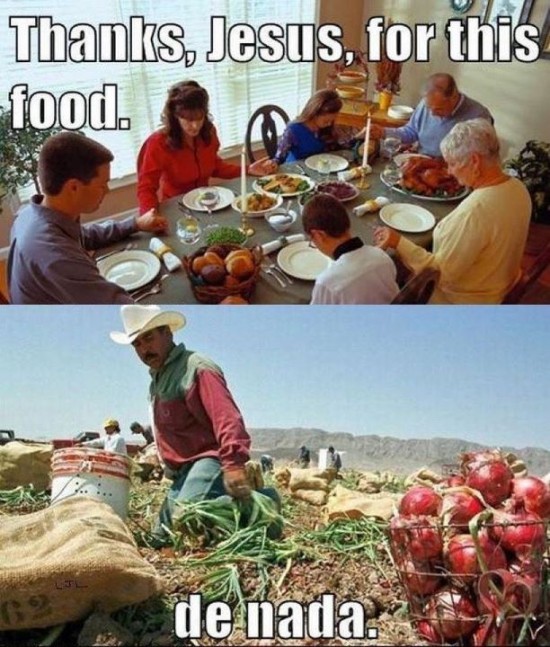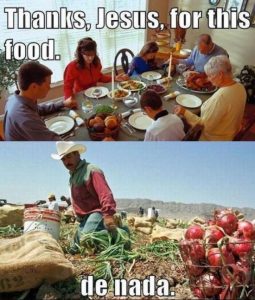We Expect Holiday Food to be Cheap, But It Has a Price

By Jose Gonzalez, NewsTaco
As we all recover from our turkey related indulgences and move on to leftover turkey tortas and other such delights, further holiday feasts await—along with continuing the season of giving thanks. Many people rightly point how much of the food that blankets our holiday table is made possible by the work of farmworkers and other food workers. As Roque Planas at the Huffington Post states:
“So when giving thanks this holiday season, don’t forget to give thanks for the men and women whose labor made it possible for you to enjoy your meal.”
The vast majority of these workers are Latinos, and they deserve such recognition and respect. But in addition to giving thanks, we should give ourselves a deeper understanding and awareness of other interconnecting issues between the people that help put the food at our table, and other affecting policies and practices.
Bluntly speaking, farmworkers do the hard and dirty work of picking the food we eat, for low pay that contributes to lower-priced food. But there is also an environmental perspective with recurring issues of pesticide use, monoculture, and the weight of the Farm Bill—all of which affect the health, safety, and well-being of our environment and the people working the fields. All to bring us affordable food for our holiday feasts.
The Farm Bill comes with a political history and accompanying fights every five years or so when it is renewed. It has an effect on food prices, healthy food options, conservation practices, alternative fuel development, global warming, and other things, right up to what is available on school lunch menus.
Generally, a lot of farmworkers work on what the Farm Bill considers “specialty crops”, the fresh fruits and vegetables we should eat, versus the vast fields of corn used for biofuel or high fructose corn syrup that finds its way into other parts of the food supply.
Looking at the dinner table, we expect low prices on food picked from the fields, but that comes via the low pay of farmworkers as well as the significant use of pesticide and petrochemical fertilizer use. Thus, Latinos in the fields suffer from low-wage and unhealthy working conditions and the environment takes a hit via the contamination and pollution of ecosystems.
We also expect low prices on processed and manufactured foods—the dinner rolls you butter, or the Doritos you snack on afterward. Much of that comes from Farm Bill government subsidies that lower the cost of commodity crops and generally encourage monoculture production. Here, many Latino communities take the hit by being more likely to live in food deserts and turn to processed foods—with higher risks for obesity and associated diseases. Latinos abroad also take a hit because Mexican maize farmers cannot compete with subsidized US corn farmers, or corporatization from firms like Monsanto. The environment still suffers from heavy use of petrochemical fertilizers, issues of genetically-engineering organisms, and loss of crop and biodiversity.
So as a Latino at the dinner table or supermarket aisle, I could look at all this several ways:
Some Latinos do not have the luxury of extra time and money to buy beyond what the standard agribusiness food system provides us—but we can at least be appreciative of the work by farmworkers and be supportive of efforts to better their working and living conditions.
Some Latinos do have the luxury of having extra time and money to go with other options, thus they could advocate for better farmworker conditions as well as explore other options that help our environment, be it farmers markets, organic food, sustainable practices, etc.
Other Latinos have the privilege of a higher education experience to critically evaluate all of this and work for systemic change, including political and policy reform on legislation like the Farm Bill.
Many of us can do all of this—and it can start by looking at where our food at the table comes from, beyond the supermarket. In addition to fighting for recognition and improvement of those that work the fields for our food, we as Latinos can contribute to better food because ideas like “organic”, “natural”, “sustainable”, “green”, and “slow food”, have deep roots in many of our cultural practices. Michael Pollan said, “Don’t eat anything your grandmother wouldn’t eat as food”. Latino kitchens should not be any different. There is a reason abuelita makes delicious flores de calabaza quesadillas, and why nopales are in just about every Latino backyard.
So as we sit down at the next holiday feast, do give thanks to those that helped put the food on your table. Furthermore, think about how we can have better conditions for them, better food overall, and a better environment for everyone.
[Photo: familiar meme, author unkown]

